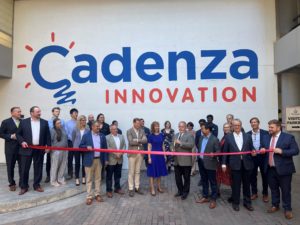Cadenza Innovation Consolidates In Danbury, With Plans To Expand
CT PatchCadenza Innovation consolidated its lithium-ion operations into bigger digs at the former Union Carbide building. What happens next?

Danbury Mayor Dean Esposito joined Cadenza Innovations founder and CEO Christina Lampe-Onnerud for the company’s ribbon-cutting at its new HQ at The Summit on Reserve Road. (Bryan Grillo)
DANBURY, CT — The nation is in the midst of a tumultuous energy transition, but one Danbury company has plans to ride that whirlwind into record profits.
Earlier this month, lithium-ion battery brain trust Cadenza Innovation consolidated its Wilton and Bethel operations into bigger digs at the former Union Carbide building, now The Summit, on Reserve Road. The company currently licenses part of its technology to global manufacturers and will soon expand its efforts into manufacturing activities across the U.S.
Cadenza’s founder and CEO Christina Lampe-Onnerud is bullish on her batteries’ potential.
“Everything need electrons,” she told Patch.
No lie, there. The global lithium-ion battery market was valued at nearly $42 billion in 2021. The CEO predicted her company would be swimming in a trillion dollar market by 2030, driven in part by the electrical needs of the U.S. which will double over the next four to seven years.
How all that juice will be generated, conventionally or through alternative means, is still a horse race. Lampe-Onnerud said that solar is now the least expensive means to generate electricity, followed by wind power, but there have been meaningful efficiency gains in fossil fuel generation as well.
In the industry of electrons, only one thing is certain.
“All of them need some level of storage,” Lampe-Onnerud said. “And this is why batteries become so critical, because all of the generation is more or less steady stream. So when the sun is shining, that’s when you can collect electricity generated. And if you don’t use everything, you waste it. If you have a battery, you can store it. And the same is of course true when you have wind, which is typically at night.”
Lampe-Onnerud knows her way around both boardrooms and research labs. Previously, she served as a principal at the Arthur D. Little consulting firm, where she ran one of the world’s largest independent testing laboratories. She currently sits on MIT’s Chemistry Department Visiting Committee, and has twice been recognized as a World Economic Forum Technology Pioneer. In April, she was selected for the King’s Medal – one of the most prestigious awards in her native Sweden– for her outstanding contributions to Swedish business. Most recently, Cadenza was named “Innovator of the Month” by Sen. Chris Murphy, who praised the company for “leading the way in safe, low-cost clean energy storage.”
The “safe” bit is a key component of Cadenza’s marketing strategy and ongoing success: its batteries don’t explode or catch fire. The company’s patented superCell technology positions the battery’s otherwise volatile metal core “jelly rolls” within a noncombustible ceramic fiber material, like eggs inside a fireproof carton.
What Cadenza does hope to set on fire, is Danbury’s job market. The company has open positions in finance, operations and software engineering posted on its website.
The CEO sees the growth and opportunities at the company’s new Danbury headquarters mirrored in the lithium-ion industry’s own flight plan.
“It is in the high-tech sector, with a lot of job growth opportunity that stretches from people who are street smart, to book smart, to people who are hustlers and teammates,” Lampe-Onnerud said.
It’s a high-growth industry that American companies have the opportunity to dominate, the CEO said, but it won’t be easy.
“China has a head start,” the Lampe-Onnerud said. “But in the US, once we decide to do things, we can do it very quickly, and especially if we mobilize on multiple fronts.” She said that both the government and energy companies are in the midst of “basically establishing a call to action,” which she described as “pretty inspiring.”